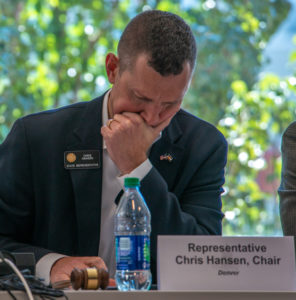GRAND JUNCTION, COLO–The 10-member Colorado Energy Legislation Review Interim Study Committee met at Colorado Mesa University in Grand Junction Friday to hear from Western Slope officials and energy companies about the impacts of Governor Polis’ plan for a new energy economy.
Western Slope electric companies and county commissioners from Mesa, Delta, Routt, Moffat and Gunnison counties testified about the potential disastrous impacts of last session’s Senate Bill 19-181 and Governor Polis’ plan for “100% renewable energy.”

High on the list of issues for the electric power cooperatives is the application of Tri-State Generation & Transmission Association to be placed under the control of the Federal Energy Regulatory Commission (FERC) for rate regulation.
Tri-State is a generation and transmission cooperative that covers four states including Wyoming, Nebraska, Colorado and New Mexico and has 43 electric co-ops as members.
In a July 23 press release Tri-State says it has “considered FERC regulation since 2010, as both Colorado and New Mexico exercised wholesale rate jurisdiction over Tri-State, which resulted in increased costs, unrecovered revenue and inconsistent rates to its members. FERC rate regulation pre-empts individual state rate regulation for generation rates, transmission rates, rate design and all other rate-related matters.”
The press release goes on to say, “Rate regulation by FERC does not change compliance with other facility-related state requirements, including resource planning, compliance with renewable portfolio standards, state carbon reduction plans, the building of new facilities and the retirement of existing facilities.”
Stable wholesale power rates are important to Tri-State’s 18 Colorado members, which include independent cooperative power producers all over the state.
Jessica Matlock, CEO of the La Plata Electric Association said they serve 43,000 electric meters but produce only 5% of their power needs. “It’s hard to reduce carbon when we only generate 5% of our power,” said Matlock.
Jason Bronec, CEO of the Delta Montrose Electric Association said they serve “some of the poorest residents in Colorado.”
He spoke of a pressing need for advanced communications networking such as fiber-optic service to homes to provide internet service to facilitate telemedicine, remote workforce and education needs.
Tom Walch, CEO of Grand Valley Power, Colorado’s oldest electric power cooperative serving 19,000 meters said that Colorado’s ratio of income to energy costs is the lowest in the nation at less than 1.5%. The national average ratio is 2.2%.
Alan Michalewicz, CEO of White River Electric Association, Colorado’s smallest electrical cooperative, serving 3,500 meters, said they have rural renewable energy projects including a small solar installation, a small hydro installation using a ditch company’s water, and a 4 megawatt solar project.
Telling the Committee that White River relies on Tri-State’s generating capacity to handle their widely-varying loads, Michalewicz said, “we serve some very large industrial loads. There is no demand side control and Tri-State assumes the risk of varying loads.”
Bryan Hannegan, President and CEO of Holy Cross Energy said they are leading the clean energy future. He said they are providing free electric vehicle chargers and are working on a pilot project to bill customers for an electrician’s installation costs over 36 months to relieve the problem of customers not being able to afford the up-front costs that left some of the free chargers sitting in boxes. Hannegan also brought up the issue of fire liability insurance, grid reliability and redundancy. “We were one pole away from losing Aspen during the Lake Christine fire,” Hannegan said.
Mesa County Commissioner Rose Pugliese pointed out that like most of Colorado’s western counties Mesa County is 76% public lands. “We are the hub of the energy industry,” said Pugliese. “The wells are mostly in other counties, but the people and companies are in Mesa county.”
Grand Junction and Mesa County are already feeling the effects of Polis’ plan as oilfield support services are already leaving the state for more favorable regulatory climates in Texas.
Pugliese said the weekly avg wage in the county is $1600, and that each drilling rig creates 208 direct and associated jobs.
Her hope is to preserve western Colorado’s oil and gas industry by selling to new markets.
“The goal is to market natural gas resources to places like Japan through the Jordan Cove project” said Pugliese.
Jordan Cove is a planned liquified natural gas export terminal being proposed in Coos County, Oregon that is projected to bring in more than $110 million in state and local taxes and provide more than 14,000 jobs in Oregon. Natural gas would be sent to the terminal by existing underground pipelines.
The project is still under review by FERC and there has been substantial resistance to the terminal within Oregon by ecological activists.
“We are very different from the Front Range,” said Pugliese. “Please do no harm to our energy economies.”
All of the county commissioners were worried about the closure of coal-fired electric plants and their associated coal mines under Polis’ plan.
Despite the promises of a “just transition” to a non-coal rural economy, commissioners and others were highly skeptical that many rural towns and counties will be able to survive the shift away from an energy extraction and production economy.
Suzanne Tegen, Assistant Director of the Center for the New Energy Economy, a Colorado State University sponsored energy policy group led by former Governor Bill Ritter Jr., said, “I’m not trying to paint a rosy picture. I don’t see a way to replace [highly paid miner’s and electrical worker’s] salary. That doesn’t seem realistic to me after we’ve transitioned away from coal. It’s a cultural and economic problem.”
She said the closure of coal plants in Poland radically shifted the culture and now the men aren’t working but the women are.
Mark Haggerty of Headwaters Economics, a Bozeman, Montana non-profit policy research center said, “It’s very difficult for communities that have become dependent on the wages and taxes that have not planned ahead. There are very few success stories for transition communities.”


